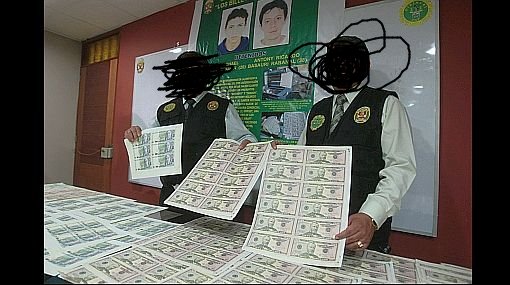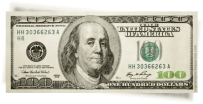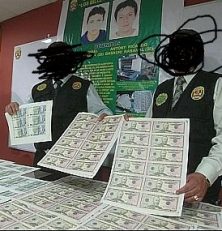Busting Myths: There Is No Best Place to Exchange Fake Money
According to the United States Federal Reserve, less than 0.01 percent of all U.S. currency that is currently in circulation is counterfeit; however, when there are more than 50 billion notes in circulation worth more than $2 trillion, even one out of every 10,000 bills can quickly add up to a significant amount of money. The United States Secret Service is the government agency that is responsible for locating and arresting counterfeiters; nevertheless, the monetary system itself contains various safeguards that are designed to detect phony bills.
How Counterfeit Detection Works
You might think that banks are the best place to exchange fake money, but this isn’t the case. The banks that are part of the Federal Reserve System are the initial verification point for currency. The task of supplying commercial banks with currency falls within the purview of the Federal Reserve banks; this includes both “fresh” bills and notes that have been “recirculated.” The Federal Reserve does not make its procedures public, but it does have its own scanning and detection systems for sorting real money from counterfeit bills.
Another possible location for the discovery of counterfeit money is commercial banks. Tellers and other members of the bank staff go through extensive training to learn how to detect counterfeit money by looking at it, feeling it, and performing a fast check of the concealed security features.
The most susceptible targets for counterfeit money are commercial establishments and retail shops. If a company agrees to take a counterfeit bill and then deposits that bill into their bank account, the bank will discover the fraud and charge the owner of the company for the amount that is not deposited. Workers who operate cash registers receive training on how to detect counterfeit dollars by examining them under a light to check the embedded security strip and by checking for the text that changes color.
If you or your company is in possession of a bill that you have reason to believe is counterfeit, you should immediately contact the local authorities or report it to the Secret Service via the website for U.S. dollars.
Crime and Punishment: The Counterfeit Way
It is important to note that counterfeiting is not a small crime. This is not the same as running a red light or even stealing from a store. These offenses are classified as misdemeanors and are prosecuted at the local level by the police and courts in that area. So, if you’re wondering why there is no best place to exchange fake money, this is why. Nobody wants the risk.
Counterfeiting is a federal crime that is investigated and prosecuted by the Secret Service of the United States. You read that right. To combat forgers and other counterfeiters was, in point of fact, the primary motivation behind the establishment of the Secret Service. Later on, it expanded its duties to include providing additional security for the president and other high-ranking people in the government.
Because of how essential money is to the functioning of our economy and society as a whole, forgery is viewed as a particularly serious criminal offense. To put it another way, money is the economy’s oxygen. When people lose faith that the money they carry around is genuine, it becomes much more difficult for them to make purchases, which in turn slows down the economy.
The punishment can be fairly severe if you are found guilty of counterfeiting, which is inevitable if you engage in the activity because you will eventually be discovered. If someone is found guilty of counterfeiting United States cash, they could face a fine of up to $250,000 or up to 20 years in jail, all of which are possible outcomes according to federal law. In actuality, the majority of counterfeiting operations are quite minor.
Let’s take an example to illustrate. In the year 2020, more than half of all counterfeiting convictions were for amounts that were less than $6,500 (the median loss was $4,600), and as a result, the punishments for counterfeiting were less severe. According to the Secret Service, the standard sentence for counterfeiting in the year 2020 was 18 months in prison. If the possibility of fines and time spent in jail aren’t enough to dissuade you, there are other consequences as well.
In addition to this, the authorities will seize any property that was utilized to draught or pass these criminal measures. If this is the case, then your computer, printer, and scanner will be taken away from you. To put it another way, the picture is not ambiguous. If you attempt to pass off fake currency, you are going to get detected. There are a great number of people who are on the lookout for phony bills since they do not wish to be taken advantage of in any way.
If you are found guilty, you will face severe punishment, and it is highly likely that a portion of that punishment will be served behind bars. The promise of a federal felony might not sound very bad, but once it is on your record, it’s there forever. This will make it very difficult for you to get work in the future.
To put it another way, it is not possible to get something for nothing, at least not if you are attempting to do it through counterfeiting. Even while it is simple to print your own money, it is highly unlikely that you will be able to spend it without being discovered.
Protecting Yourself from Counterfeit Cash in the Future
You need to be aware of the counterfeiting problem regardless of whether you are a typical person getting your change at a store or a merchant collecting cash in your business. Both groups need to be aware of the issue. In the absence of a “best place to exchange fake money,” the following is a list of measures that you can take to protect yourself:
- Maintain vigilance and examine the currency you are given by looking at it and handling it. Keep in mind that the paper that is used to produce authentic bills is not accessible commercially; thus, the fact that counterfeit bills feel “wrong” is a major giveaway. The paper’s surface should have the texture of cotton and fiber, and the ink should be slightly elevated.
- Examine the bills while they are in the light. It is incredibly difficult to forge the color-shifting ink. It is not possible to make a copy of the security stripe or the watermark using a standard home printer. A genuine bill’s security thread should emit a glow when examined with a black light.
- When dealing with a lot of smaller denominations–think $10–the best thing to do is check the serial numbers for duplicates. Check to see that the serial numbers are distributed consistently across the bill.
- Be especially wary of older bills (those having patterns from before 1996) and bills for greater denominations, as they are more likely to be counterfeit.
- Call the police immediately if you suspect that the bill you have been given is a fake.
- There has been a significant amount of effort put into the design of bills that are difficult to forge. If you take advantage of the new safety features, it should not be difficult to identify counterfeit money.
What to Do with Fake Money
While there is no one best place to exchange fake money, there are communities of collectors out there who will, in fact, give you money in exchange for fake currency. However, in order to avoid breaking the law, you will need to carefully mark each note with markings that cannot be removed and that make it very evident that the bills represent “play money.” Because getting these particulars incorrect might have extremely serious repercussions, it is highly recommended that you get the advice of a local attorney before proceeding, as the specific regulations differ from state to state.
You can spend your counterfeit money in locations where people are too busy to inspect the notes you are using to pay for things. You can readily spend your money at crowded venues like hotels, shopping malls, bars, and restaurants, to name just a few examples of the kind of establishments that fit this description.
The fact that many different financial transactions may be traced is one of the most significant dangers. It is possible that using your bills will not involve your name, but if you appear on numerous recordings, it will become easy to identify you. This is because the majority of retail outlets have video surveillance.
This indicates that the key is to utilize it in transactions that are not going to be tracked. The most trustworthy sources are those who engage in unlawful trade. Neither party is interested in keeping any kind of record of the transaction. As a result, it is an extremely effective method for passing counterfeit cash. You may not get into many problems with the law if you do this, at least not for having used fake money.
Last but not least, you have the option of spending it with someone who is aware that it is fake but doesn’t care, such as a drug dealer. Tell them that you are not attempting to take advantage of them in any way. They are fully aware that it is a fake. Every drug dealer who’s been in the business for a while has encountered a lot of fake money. They are aware of what can be considered worthless and what can be considered valuable to someone, someplace.

Conclusion
If you are looking for the best place to exchange fake money, then you are bound to be disappointed. We have illustrated why in this article, but it bears repeating. Counterfeiting is a serious offense, and if you are caught, you will be going away for a long, long time. There’s nothing fake about that. So, if you happen to come across fake money, turn it in and absolve yourself of wrongdoing and suspicion. U.S. laws don’t take it easy on anyone.
Talk to a representative from the institution the money came from, preferably before leaving the location, if the money came from a bank or another business. It’s possible that they will be willing to swap it for a real bill. If this is not the case, or if the money came from an individual, you should contact the police.
Dealing with the authorities at the time of the discovery of a questionable bill is likely to be less taxing than responding to inquiries from them at a later date as part of an investigation into a possible criminal offense. In addition, if you need to file a claim for any losses using your insurance policy, a police report is likely going to come in very handy.
Keep yourself safe! Good luck!


Recent Comments